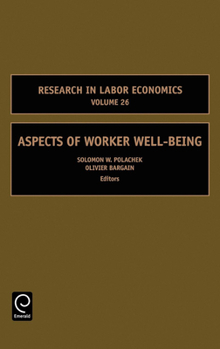Aspects of Worker Well-Being
This volume contains thirteen new and original chapters on topics relating to worker well-being. It deals directly with how economic institutions affect individual and family earnings distributions. Topics covered include job training, worker and firm mobility, unions, collective bargaining, minimum wages, unemployment insurance and schooling. Among the questions answered are: To what extent do greater work hours of women mitigate the widening of the family earnings distribution? To what extent does the decline in unionization widen the distribution of earnings? To what extent do computers expand the earnings distribution? To what extent does the Russian wage distribution change if one accounted for wage arrears? To what extent does business relocation bring about job creation and job destruction? To what extent does maternal education increase children's education? To what extent do job skills matter for low-income workers? And finally, why do minimum wage increases often fail to lead to increases in unemployment? There are thirteen new and original chapters containing research on aspects of worker well-being. Each chapter is written by experts in the field.
Format:Hardcover
Language:English
ISBN:0762313900
ISBN13:9780762313907
Release Date:March 2007
Publisher:Jai Press Inc.
Length:484 Pages
Weight:1.87 lbs.
Dimensions:1.1" x 6.1" x 9.2"
Customer Reviews
0 rating





